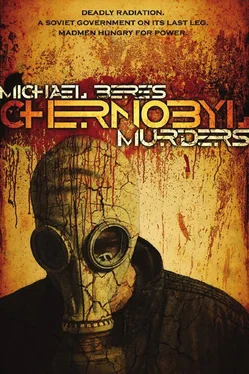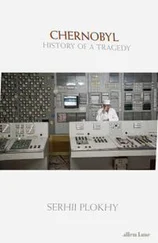Michael Beres - Chernobyl Murders
Здесь есть возможность читать онлайн «Michael Beres - Chernobyl Murders» весь текст электронной книги совершенно бесплатно (целиком полную версию без сокращений). В некоторых случаях можно слушать аудио, скачать через торрент в формате fb2 и присутствует краткое содержание. Жанр: Триллер, на английском языке. Описание произведения, (предисловие) а так же отзывы посетителей доступны на портале библиотеки ЛибКат.
- Название:Chernobyl Murders
- Автор:
- Жанр:
- Год:неизвестен
- ISBN:нет данных
- Рейтинг книги:4 / 5. Голосов: 1
-
Избранное:Добавить в избранное
- Отзывы:
-
Ваша оценка:
- 80
- 1
- 2
- 3
- 4
- 5
Chernobyl Murders: краткое содержание, описание и аннотация
Предлагаем к чтению аннотацию, описание, краткое содержание или предисловие (зависит от того, что написал сам автор книги «Chernobyl Murders»). Если вы не нашли необходимую информацию о книге — напишите в комментариях, мы постараемся отыскать её.
Chernobyl Murders — читать онлайн бесплатно полную книгу (весь текст) целиком
Ниже представлен текст книги, разбитый по страницам. Система сохранения места последней прочитанной страницы, позволяет с удобством читать онлайн бесплатно книгу «Chernobyl Murders», без необходимости каждый раз заново искать на чём Вы остановились. Поставьте закладку, и сможете в любой момент перейти на страницу, на которой закончили чтение.
Интервал:
Закладка:
“This storm will blow over, I think,” says Anton in English over his shoulder.
Lyudmilla nods agreement. The young man smiles at Lyudmilla. It is a pleasant smile. She has seen other African Americans on the tour, but not many, and especially not this young. The shade of the young man’s skin is comfortable, like honey or bread toasted to perfection. The man is tall, his shoulders wide, his dark slacks showing at his ankles because the coveralls are too short for him.
Lyudmilla became fond of the couple early in the tour. While observing photographs of Chernobyl victims, the young woman began weeping. Lyudmilla can still picture the way the tall young man with his strong arms and hands held onto the young woman. Lyudmilla assumes they are not married because they signed up for the tour separately, whereas a married couple could have used a single sign-up form. Although she cannot recall their names at the moment, Lyudmilla recalls the young woman touching a particular photograph in the museum before she began weeping. Not one of the many firemen, but rather a reactor worker who died a few days after the accident in Moscow. She recalls wondering whether the young woman was related to the victim in the photograph and was going to ask about this, but the German tourists, whom she has seated at the rear of the van, had interrupted at that point and carried on with questions for what seemed hours.
Outside the wind is dying down, but it is not raining. “The weather front,” announces Anton over his shoulder. “It will blow over in a few minutes.”
Across the aisle from Lyudmilla, the young man puts his arm around the young woman’s shoulder. The young woman’s pale skin goes well with her greenish-gray eyes. Her skin also contrasts nicely with the hand of the young man. The two lean close and speak quietly.
“Reminds me of a black-and-white movie about nuclear war,” says the young man.
The young woman pulls his hand from her shoulder to her mouth, kisses it. “Like On the Beach where the submarine parks in San Francisco Bay, and they look through the periscope at empty streets. Except for being overgrown, it’s like people simply disappeared one day.”
“I was thinking of Fail-Safe,” says the young man. “But in that movie the people are in the city when it gets nuked.”
The young woman points out the van’s windshield. “I can’t help wondering what apartment they lived in.”
Lyudmilla, who has been listening in, stands in the aisle, pushes her hands into the deep pockets of her coveralls, and speaks to all the passengers. “In some apartments letters were found. Children, prompted by teachers, wrote letters to their homes, saying good-bye. School was in session in Pripyat that Saturday, and teachers must have been aware of the explosion occurring a little after one in the morning. Even though evacuation had not yet begun, teachers may have guessed the seriousness of the situation. This was the exception. In most cases residents assumed they would be gone only a few days. So much was left behind. Over the years, and even though they are not supposed to be in the exclusion zone, looters have done their damage. You will notice most window glass and doors have been removed. This allows outside air to flow freely in the buildings so radiation hot spots will not accumulate.”
Lyudmilla holds one pocket out wide to check her radiation monitor again, then pulls her hand from her pocket and points up the street. “The shorter building near the Ferris wheel was an indoor swimming pool. There were many schools and kindergartens. Inside these, lesson plans and children’s drawings still hang on walls.”
A man speaks loudly with a German accent from the back of the van. “You said how many lived here?”
“Approximately forty thousand men, women, and children lived in Pripyat. Although we call it a town, many considered it a city.
Most worked at the Chernobyl plant, as I said, but some worked at the radio factory.”
“Is the radio factory still in operation?” asks the German man.
“The factory was here in Pripyat,” says Lyudmilla. “Nothing is in operation in Pripyat.”
“The wind is less,” announces Anton. “I shall drive to the May Day carnival site, and there we can open windows and listen to silence. Next we go to the sarcophagus, where we will be able to get out and listen to silence there.”
Lyudmilla sits down, Anton puts the van in gear, and they drive slowly down the street.
The front has passed, the air has freshened and cooled, and the sun is out as the tourists in their off-white coveralls exit the van at the sarcophagus observation platform. Because construction is in progress on the new sarcophagus, it is not as quiet here as it was when they opened the windows of the van at the carnival site. A crane is running, lifting a shiny rectangular section to be fitted onto the structure going up around the perimeter of the old sarcophagus.
The old sarcophagus is gray, like a tombstone, making the new sections surrounding the base into a necklace in the sun.
Lyudmilla stands at the railing at the front of the observation platform. She has taken a radiation measurement, which she announces to be a safe three hundred micro-roentgens per hour. In the distance, where the core of Chernobyl number four is buried beneath tons of concrete and steel, the crane suddenly stops running, and it is deathly silent.
“Don’t worry,” says Lyudmilla. “The workers have simply reached the end of their shift at the site.”
She points to the base of the sarcophagus in the distance. “See the movement at the cab of the crane? The shift is changing. Workers can only be in certain locations for short periods.”
“How short and how many roentgens?” asks the German man, his voice booming in the silence.
“I am not a technician,” answers Lyudmilla. “You will be able to ask technical questions at the lecture after our lunch back at the Slavutych Visitor Center outside the inner zone. Please save your questions for then. For now we should board the van because our lunch will be waiting. Our last stops will be the red forest and the vehicle graveyard, where is located equipment used during the initial work at the site. These include helicopters, fire trucks, and countless other vehicles.”
As they walk to the van, Lyudmilla stays close behind the young American couple and listens in to their conversation.
“I can understand why your father didn’t want to come with us,” says the young man.
“He’s not really my father, Michael.”
The young man turns with a puzzled look. “But you call him Dad.”
“I know,” says the young woman, turning to smile up at the young man. “And he is.”
Lyudmilla almost runs into them when they suddenly stop walking. She steps to one side but continues listening in.
“This must be part of the puzzle,” says Michael. He looks back at the necklaced sarcophagus. “This entire place is a puzzle.”
The young woman smiles and pokes him in the ribs.
He laughs and pokes her back.
Their laughter breaks the stagnant silence. Lyudmilla has turned to watch the others climbing into the van. An older woman whose coveralls are much too large for her frowns and shakes her head at the young couple. But Lyudmilla pays the older woman no mind. Suddenly her thoughts are elsewhere. She is with Vitaly.
They are basking in the sun at a Black Sea resort. It is 1991. The union has fallen, and although most resort visitors don’t seem to know whether to celebrate or despair, she and Vitaly chose to celebrate because they are young and in love. If only Vitaly were here with her today. If only they were young and in love again. Perhaps they could at least be in love again. She recalls their bitter argument before this shift of duty. Vitaly most likely at home brooding all week… if he is home.
Читать дальшеИнтервал:
Закладка:
Похожие книги на «Chernobyl Murders»
Представляем Вашему вниманию похожие книги на «Chernobyl Murders» списком для выбора. Мы отобрали схожую по названию и смыслу литературу в надежде предоставить читателям больше вариантов отыскать новые, интересные, ещё непрочитанные произведения.
Обсуждение, отзывы о книге «Chernobyl Murders» и просто собственные мнения читателей. Оставьте ваши комментарии, напишите, что Вы думаете о произведении, его смысле или главных героях. Укажите что конкретно понравилось, а что нет, и почему Вы так считаете.












